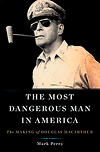
The Most Dangerous Man in America: The Making of Douglas MacArthur, by Mark Perry, Basic Books, New York, N.Y., 2014, $29.99
Like his subject, Mark Perry’s biography of General Douglas MacArthur is sure to stir extreme passions. Perry admits that MacArthur was “among the most controversial generals in American history.” To this day people either revere or loathe him; there doesn’t seem to be any middle ground.
Like everything written or said about MacArthur, this evaluation requires careful consideration and examination in context. Take the title, The Most Dangerous Man in America, derived from a remark made by Franklin Roosevelt during a private conversation in 1932. What Roosevelt opined was that, from a political standpoint, the two most dangerous figures in America at that time were Huey Long and Douglas MacArthur—one due to his political influence as a Southern populist demagogue, and the other because he was the darling of the wealthy conservative Republican elite. Both appealed to political extremists, albeit of diametrically opposed viewpoints.
It is also clear where Perry stands regarding MacArthur’s military record; he considers him one of the most brilliant commanders in American history and credits him with winning the war in the Pacific virtually single-handed. Many who served in the Pacific would question that assessment of the vainglorious commander whom some referred to derisively as “Dugout Doug.”
There is a reason MacArthur’s name most often springs to mind at the mere mention of the Pacific War. He maintained his own public relations corps to ensure he received credit when things went well and escaped blame when things went badly. Yet MacArthur’s position was Supreme Commander, Southwest Pacific. The overall Commander in Chief, Pacific (CINCPAC), was Admiral Chester W. Nimitz, whose name lags behind MacArthur’s in popular memory.
MacArthur even managed to make withdrawal from the Philippines without the bulk of his forces seem heroic. When Lt. Gen. Joseph Stillwell received a similar order to evacuate Burma, he insisted on walking out alongside his men. Yet it is MacArthur who is remembered as the hero, while the true heroism of “Vinegar Joe” has been forgotten. Perry credits MacArthur with accomplishing more with fewer assets than any other general. Again, though, Stillwell had to manage with virtually no U.S. assets and deal with two allies, Britain and China, who often worked at cross-purposes to one another, as well as to Stillwell. MacArthur firmly believed that wherever he was serving was the most important theater of the war and constantly complained of being deprived of military resources by the needs of the European theater. Yet, in retrospect it is clear Stillwell was the one given short shrift, and that he managed to accomplish anything at all is astonishing.
While well written and researched, The Most Dangerous Man in America is bound to foment renewed debate. But then how could it be otherwise with any new book dealing with MacArthur? Whatever feelings he may stir up, apathy is not, and never has been, among them.
—Robert Guttman




